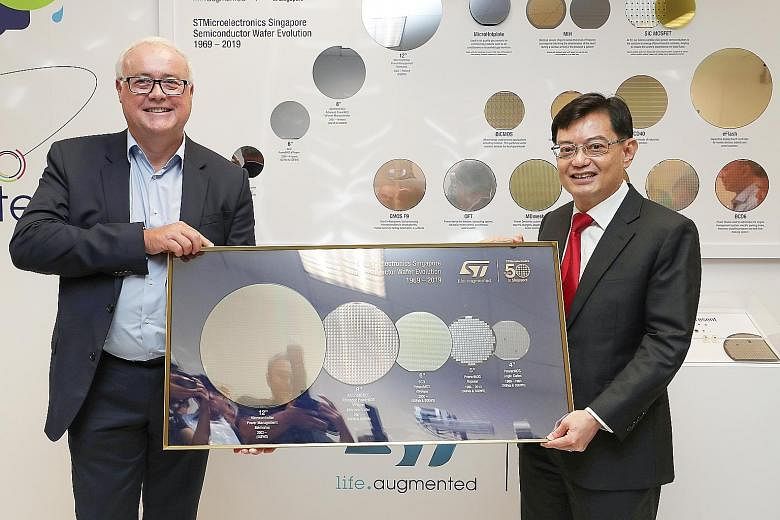The current slowdown in the global semiconductor industry does not dim its prospects, as there is fresh demand driven by the Internet of Things, artificial intelligence and mobility services, Deputy Prime Minister Heng Swee Keat said yesterday.
Mr Heng, who is also Finance Minister, added that investments in the sector here reflect a long-term strategic perspective and affirm Singapore's approach to its economy.
He was referring to European chipmaker STMicroelectronics, which officially expanded its wafer fabrication facility in Ang Mo Kio yesterday - more than doubling its capacity to manufacture eight-inch wafers in Singapore.
The expanded facility adds more than 400 jobs here and is its largest such production site by volume, making up more than two-fifths of the company's output.
This is the second major wafer fabrication facility that Mr Heng has launched in two months, following US-based global semiconductor company Micron Technology's "multibillion-dollar" expansion last month.
"ST's latest investment here is in line with its strategic pers-pective, because the future of the global semiconductor industry is bright, despite the slowdown today," Mr Heng said at the opening of the STMicroelectronics facility yesterday.
His comments come amid official expectations of a full-year manufacturing decline here, with the latest Enterprise Singapore data released yesterday showing that non-oil domestic exports fell again last month.
In particular, electronic exports were down 25.9 per cent year on year, steeper than the previous month's 24.2 per cent drop.
Mr Heng attributed the semiconductor slowdown largely to global economic uncertainties and weaker demand from some end-markets, especially consumer electronics.
There are more than 60 semiconductor companies in the Republic, making up 11 per cent of global market share. The semiconductor industry forms about 7 per cent of Singapore's economy.
But the Deputy Prime Minister remained optimistic, pointing out that there remained areas for growth in the sector.
The global automotive industry semiconductor market - for electric vehicles and autonomous ones - is expected to expand from US$37.4 billion (S$51.5 billion) in 2017 to over US$58.5 billion in 2023.
STMicroelectronics is already augmenting its strength in the areas of car electrification and digitalisation, as well as other high-growth industrial processes.
"It is investing heavily to develop more speciality products for these areas, and this new facility in Singapore will certainly put the company in a good position to do so," Mr Heng said.
He added that the company was also investing in its employees and building the local talent pool.
STMicroelectronics has close to 5,000 workers here, with more than 40 per cent of its front-end manufacturing roles being those of operators, followed by engineers and technicians.
STMicroelectronics chief ex-ecutive Jean-Marc Chery said there is ever-increasing demand for complex electronics systems, needed for products that help to solve challenges such as population increases and rising complexities in mobility.
The company wants to be a leader in the automotive sector, among other areas.
Mr Chery said Singapore is a "strategic location" for its investment, with pro-business policies as well as a highly educated and skilled workforce.
STMicroelectronic's latest expansion sits on a facility which it bought from Micron for US$30 million in 2017. It also took in the 300 or so staff previously under Micron, said Mr Calvin Goh, production manager at the new facility.
While the company declined to reveal how much the latest ex-pansion cost, Mr Chery said that it has invested more than US$5 billion in Singapore over the past 20 years.


